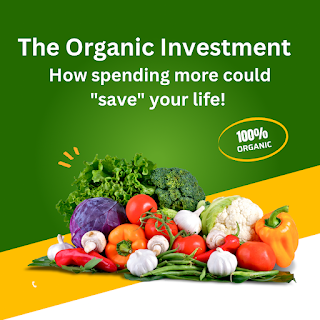The Organic Investment: How Spending More Could Save Your Life!
A Worthwhile Investment: The Importance of Buying Organic Food
In recent years, the demand for organic food has been on the rise as people become more conscious of the impact their dietary choices have on their health and the environment. While organic food often comes with a higher price tag, the benefits it offers make it an extremely worthwhile investment. In this week’s blog post, we will explore the importance of spending that extra money to buy organic food and how it can positively impact our well-being and the world around us.
- Health Benefits: Organic food is grown without the use of synthetic pesticides, herbicides, and genetically modified organisms (GMOs). By choosing organic, you reduce your exposure to harmful chemicals which have been linked to various serious health issues. Studies also suggest that organic produce may contain higher levels of beneficial nutrients, such as antioxidants and vitamins, contributing to improved overall health.
- Environmental Impact: Organic farming practices prioritize soil health, biodiversity, and water conservation. By supporting organic agriculture, you contribute to the preservation of ecosystems and the reduction of water pollution. Organic farming also avoids the use of synthetic fertilizers, which can contribute to harmful algal blooms and various other environmental problems.
- Support for Sustainable Practices: When you opt for organic food, you support farmers and producers who are committed to sustainable practices. Organic farming encourages crop rotation, composting, and natural pest control methods, fostering long-term soil fertility and reducing reliance on chemical inputs. By supporting these practices, you contribute to the preservation of agricultural traditions and the future of sustainable food production.
- Animal Welfare: Organic animal products come from animals raised in humane conditions, with access to outdoor spaces and natural diets. Organic certification ensures that animals are treated with care and are not subjected to routine use of antibiotics or growth hormones.
- Taste and Quality: Organic food often boasts superior taste and quality compared to conventionally produced counterparts. Organic crops are grown in nutrient-rich soil, without synthetic additives, resulting in more flavorful and vibrant produce. Additionally, organic farming practices prioritize crop diversity and heritage varieties, offering a wider range of unique and delicious flavors.
It's worth noting that while organic produce may have less pesticide contamination, even foods with the sticker still often contain considerable traces of these chemicals. Levels of contamination may vary depending on the time of year and the particular type of fruit or vegetable. For an up-to-date report of which kind of produce to avoid, consult EWG.org’s “Dirty Dozen” and “Clean Fifteen”.
Check it out! http://ewg.org/
While the higher cost of organic food may be a deterrent for some, the benefits it provides far outweigh the price difference. By investing in organic food, you prioritize your health, support sustainable practices, protect the environment, and contribute to more humane animal treatment. Remember, every purchase is a vote for the type of world we want to live in. So, choose organic and nourish your body while simultaneously making the world a better place!



Comments
Post a Comment